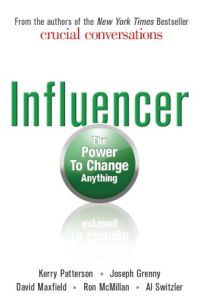
Influencer
The Power to Change Anything
Recommendation
This book is a joy, and, as the authors no doubt intended, an inspiration. Often, those who try to create change over the long term give up and become resigned to the way things are. Into this stable situation come five authors – Kerry Patterson, Joseph Grenny, David Maxfield, Ron McMillan and Al Switzler – full of optimism, examples and, best of all, practical techniques you can use right away to create change. It would be easy to say the book is too optimistic, or that it claims too much is possible, but some of its examples show the success of sweeping, ambitious changes. Instead of clinging to a dour but “realistic” view of the world, they invite you to re-examine your influence strategies and analyze your environment for new clues, whether you are trying to change yourself or your employees. The social possibilities are exciting. getAbstract recommends this book to anyone who is trying to create social change, and especially people who are open-minded and at ease with new ideas.
Summary
About the Authors
Kerry Patterson is a training program author. Joseph Grenny is a speaker and founder of a nonprofit organization. David Maxfield is performance researcher and speaker. Ron McMillan is a leadership speaker and consultant. Al Switzler is a training expert and faculty member at the University of Michigan. They lead a corporate training and organizational performance firm, and also co-wrote Crucial Conversations and Crucial Confrontations.














Comment on this summary